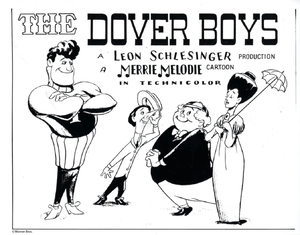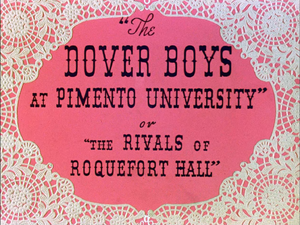The Dover Boys at Pimento University
| The Dover Boys at Pimento University | |
|---|---|
 Lobby card. | |
| Production company | Leon Schlesinger Productions |
| Distributor | Warner Bros. Pictures The Vitaphone Corporation |
| Release date | September 19, 1942 |
| Run time | 9 minutes |
| Starring | Mel Blanc Tedd Pierce Marjorie Tarlton[1] |
| Narrated by | John McLeish[2] |
| Music composition | Carl W. Stalling |
| Story | Tedd Pierce |
| Animation | Robert Cannon |
| Director(s) | Charles M. Jones |
| Series navigation | |
| ← Previous | Next → |
| Title card | |

| |
The Dover Boys at Pimento University; or The Rivals of Roquefort Hall, better known as The Dover Boys at Pimento University or simply The Dover Boys, is the two-hundred and ninth short of the Merrie Melodies theatrical series. It was published by Warner Bros. Pictures and The Vitaphone Corporation on September 19, 1942. it was written by Tedd Pierce, produced by Leon Schlesinger, and directed by Chuck Jones.
Three morally upright boys from Pimento University save their fiancé from their fiendish archenemy Dan Backslide: "coward, bully, cad, and thief."
Detailed summary
| This article or section is a stub. You can help the Looney Tunes Wiki by expanding it. |
Memorable quotes
Narrator: Out and away, the most popular fellows at old P.U. are the three Dover Boys... Tom, the fun-loving member of the trio; Dick, a serious lad of 18 summers (plus a winter in Florida, as related in "The Dover Boys at the Everglades"); and Larry, the youngest of the three jer-er, ah, brothers... A gay outing at the park has been planned by the merry trio, and they’re off to fetch their fiancé, Dainty Dora Standpipe, at Miss Cheddar’s Female Academy close by. With their usual punctuality, the boys arrive at the appointed hour of 3:00...
Dan: Hark! The Dover Boys! Drat them! Double drat them! They are escorting Dora Standpipe! Dear rich Dora Standpipe! HOW I LOVE HER... father’s money.
Dan: Confound those Dover Boys! Oh, how I hate them! I hate Tom! I hate Dick! And I hate Larry! They drive me to DRINK!
Dan: A runabout. I'LL STEAL IT! NO ONE WILL EVER KNOW!
Dora: Help, Tom! Help, Dick! Help, Larry!
Messenger: Telegram for the Dover Boys. "Messrs. Tom, Dick, and Larry, care of Wayward Tavern, Upper Bottle, New York." Says, quote, "HELP!" Unquote. Signed "Dora." Thirty-five cents collect.
Tom: Unhand her, Dan Backslide! Unhand her, Dan Backslide! Unhand her, Dan Backslide! Hey, we're getting in a rut. Stand up and fight, you coward, bully, cad, and thief!
Characters
In order of appearance: | ||||||||||||||||||||||
| ||||||||||||||||||||||
Organizations
Locations
- Earth
- United States
- New York
- Pimento University
- Roquefort Hall (mentioned)
- Park
- Miss Cheddar's Female Academy (mentioned)
- Upper Bottle
- Hunting lodge
- Pimento University
- Florida (mentioned)
- New York
- United States
Objects
Vehicles
- Runabout car
Production
Development

The Dover Boys is notable for having one of the earliest use of techniques for what would become known as limited animation, particularly with its use of having the characters stay still or move so quickly that they appear to be distorted in a few frames. This animation technique has come to be known as the smear frame.[3] Jones had taken inspiration from the latest ideas in graphic design at the time for the short,[4] making it one of the first cartoons to use other techniques that would only be more broadly popularized in the 1950s. In The 100 Greatest Looney Tunes Cartoons, animation historian Michael Barrier writes, "Is The Dover Boys the first 'modern' cartoon? …Chuck Jones stylized the animation in this cartoon in a way that anticipated what several consciously modern studios like UPA would be doing a decade later."[5]
Casting
The voices credits in the short are not easy to find apart from Mel Blanc (who did Dan Backslide in more or less of his natural speaking voice), but it is assumed that John McLeish voiced the part of the narrator; McLeash was the narrator in several of Disney's Goofy cartoons.[2] The voice of Tom was done by Tedd Pierce, who also provided the story. Dora Standpipe was voiced by Marjorie Tarlton.[1]
Music
The music was composed by Carl W. Stalling.
Release
Dates are in order of release:
- United States: September 19, 1942 in theatres
Behind the scenes
- The short is a parody of the Rover Boys, a popular juvenile fiction book series of the early 20th century.
- It contains multiple puns related to the Rover Boys series:
- The occurrences of the names Pimento, Cheddar, and Roquefort reflect the Rover Boys' old school of Colby Hall.
- Tom, Dick and Larry Dover borrow their names from Tom, Sam and Dick Rover (as well as the generic names Tom, Dick and Harry).
- Dora Standpipe is named after Tom Rover's fiancée, Dora Stanhope.
- Dan Backslide is named after Rover Boys villain Dan Baxter.
- It is one of a handful of Warner Bros. cartoons to enter the public domain, due to United Artists, the most recent holder of the cartoon, failing to renew the copyright by 1971.
Errors
- N/A (?)
Connections
- The Dover Boys are mentioned by Porky and Daffy's company boss in Tick Tock Tuckered.
- The Dover Boys would later appear in as guest characters in the Animaniacs segment "Frontier Slappy", and as cameos in Space Jam.
- Dan and Dora appear as background characters in King Tweety.
In popular culture
- With the advent of the Internet, The Dover Boys became a meme and has garnered a following in recent years; beginning as early as 2010, and then spreading further by 2016 as a popular in-joke in Tumblr.[6][7]
- In 2018, over 90 animators, led by Zureal, collaborated on a project to reanimate individual scenes of the short, in commemoration of its 76th anniversary. The video, titled "The Dover Boys ReAnimated Collab!", amassed over 340,000 views in its first full week on YouTube, and since has over 3 million views in total.[8][9]
- In the pilot episode for Hazbin Hotel, a snippet of the short can be seen at a bar's TV monitor, during Charlie's appearance on the 666 News program.
Critical reception
In other languages
| Language | Name | Meaning |
|---|---|---|
Home availability
- In the United States:
- December 11, 1991: MGM/UA Home Video releases The Golden Age of Looney Tunes: Volume 1 on LaserDisc.
- 1992: MGM/UA Home Video releases The Golden Age of Looney Tunes, Vol. 5: Chuck Jones on VHS.
- November 2, 2004: Warner Home Video releases Looney Tunes Golden Collection: Volume 2 on DVD.
- November 15, 2011: Warner Home Video releases Looney Tunes Platinum Collection: Volume 1 on Blu-ray Disc.
- July 3, 2012: Warner Home Video releases Looney Tunes Platinum Collection: Volume 1 on DVD.
- June 25, 2013: Warner Home Video releases: Best of Warner Bros. 50 Cartoon Collection: Looney Tunes on DVD.
References
- ↑ 1.0 1.1 Scott, Keith (2022). Cartoon Voices from the Golden Age, 1930-70. BearManor Media. p. 52. ISBN 979-8-88771-010-5. Retrieved February 23, 2024.
- ↑ 2.0 2.1 Barrier, Michael. "Interviews: John McGrew". Archived from the original on September 28, 2010. Retrieved February 23, 2024.
- ↑ Chuck Jones: Extremes and In-betweens – A Life in Animation (PBS 2000).
- ↑ Grant, John (2006). Animated Movies: Facts, Figures & Fun. AAPPL Artists & Photographers Press, Limited. p. 60. ISBN 978-1904332527. Retrieved March 26, 2024.
- ↑ Beck, Jerry, ed. (2020). The 100 Greatest Looney Tunes Cartoons. Insight Editions. p. 53. ISBN 978-1-64722-137-9.
- ↑ Weinman, Jaime (June 17, 2016). "We're looney for 'The Dover Boys'". Macleans.ca. Retrieved February 23, 2024.
- ↑ "The Dover Boys at Pimento University". Know Your Meme. Retrieved February 23, 2024.
- ↑ Palmer, Joshua (Zureal). "The Dover Boys ReAnimated Collab!" YouTube (August 27, 2018). Retrieved June 19, 2024.
- ↑ Amidi, Amid (September 3, 2018). Over 90 Animators Worked Together To Re-Animate The Classic Cartoon "Dover Boys" Cartoon Brew. Retrieved June 19, 2024.